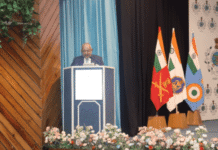Sri Vijaya Puram: A growing call for academic reform is gaining ground in the Andaman & Nicobar Islands, where students, teachers, and education officials are seeking the replacement of outdated college courses with programs more aligned to the region’s ecological and employment landscape.
The proposal focuses on revamping the curriculum of government colleges, including Jawaharlal Nehru Rajkeeya Mahavidyalaya (JNRM), to introduce degree and diploma-level courses in subjects such as Forestry, Marine Biology, Oceanography, Fisheries Science, Wildlife Management, and Coastal Resource Management.
“The curriculum has remained largely unchanged for years, even as the nature of jobs and the ecological context of the islands have evolved,” said a senior education resource person. “The Andaman & Nicobar Islands are surrounded by sea and covered in dense forests. Yet students are being offered degrees that have little connection with their surroundings.”
Currently, several of the standard arts and science programs have limited job potential within the islands, forcing many graduates to either migrate or remain unemployed. Officials familiar with the curriculum development process said the new proposals aim to connect education with the region’s natural strengths, promoting local employment in sectors like sustainable fisheries, forest conservation, marine research, and eco-tourism.
Institutions like the Kerala University of Fisheries and Ocean Studies and Forest Research Institute, Dehradun, are being considered as academic models for the islands. These universities have successfully implemented region-specific courses that address both conservation and employment, and similar structures could help build a skilled workforce for the islands’ environment-linked sectors.
A teacher from a South Andaman college noted that while students show strong interest in nature-related careers, they often lack access to formal training in those fields. “We have students from tribal and coastal communities who are deeply familiar with forest and marine ecosystems, but they have no academic path to build on that knowledge,” the teacher said.
Officials said the proposed course additions would not only help preserve the fragile biodiversity of the islands but also provide students with practical skills in disaster management, climate adaptation, and resource protection, all highly relevant in the context of the islands’ vulnerability to tsunamis, cyclones, and rising sea levels.
Currently, many students seeking specialisation in marine biology or wildlife science are forced to leave the territory, facing financial and logistical barriers in mainland institutions. The lack of in-island alternatives has created a gap between student interest and institutional offerings.
“There is a pressing need to decentralise education and offer pathways that don’t require relocation,” said a parent from North & Middle Andaman. “These courses will not only be relevant, but they can also empower students to contribute to the islands’ development without leaving home.”
The proposal also recommends the creation of dedicated departments within existing colleges and collaboration with national-level institutions to design updated syllabi and provide training for faculty.
While formal approvals are still awaited, sources within the education department confirmed that the recommendations have been submitted to the Andaman & Nicobar Administration for review.
The move comes amid broader conversations across Union Territories on aligning education with local contexts, particularly in ecologically sensitive and geographically isolated regions.
If implemented, the new academic offerings are expected to mark a significant shift in the region’s education policy, enabling future graduates to become professionals in fields that directly impact the islands’ environment, economy, and resilience.





